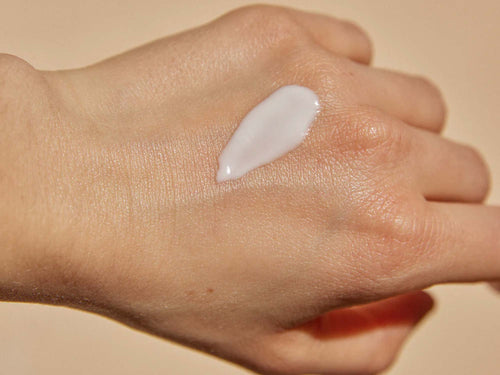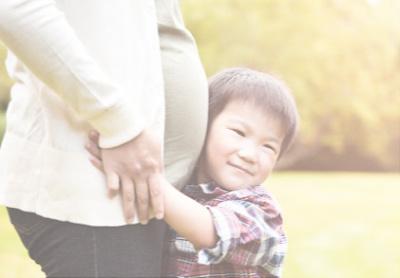The moment you find out that you’re expecting a baby can be one of the most exciting times of your life! But it can also be overwhelming as you wonder what the three trimesters ahead have in store for you, especially if it’s your first pregnancy.
Specifically, you might be wondering exactly what to expect from the first trimester.
Your baby is developing quite a bit during your first trimester — as soon as six weeks you can hear their tiny heart beating, and by the end of the first trimester, their bones, muscles, and all of their organs have formed. But even with all that development, your baby is still very small.
So while you won’t see much of a baby bump during your first several weeks of pregnancy, you’ll notice plenty of other changes in your body. Here are a few things you can expect during your first trimester and how you can best prepare.
First Trimester Basics

The first trimester includes weeks 1 to 13, meaning your first, second, and third month of pregnancy. During this trimester, you discovered your first positive pregnancy test, so congratulations are in order!
Your first trimester is a very exciting one full of different emotions and filled with awe and wonder. Even though you probably don’t look pregnant yet, you sure are feeling it!
Now is a good time to start using a Bust Firming Serum. It’ll give your skin the support it needs by hydrating and toning it. Plus, it gives your skin a firmer look and feel even during your first trimester.
The first trimester goes by the quickest because you’re probably already four to six weeks along when you find out that you’re expecting.
Some women don’t even realize they’re pregnant until they’re well into their first trimester. So by the time you’ve taken a pregnancy test, you’re almost to your second trimester!
We’ll walk you through changes to your body, your emotions, your baby, and what to expect at your doctor’s appointments during this trimester.
First Trimester: What To Expect
Your Body
Fatigue
Most women feel fatigued during their first and third trimesters, so don’t worry if fatigue hits you hard in the first several weeks — your body is hard at work, your little one is developing, and you’re getting used to many physical and emotional changes.
Hormonal changes can be blamed for much of the extra fatigue and sleepiness. Plus, your blood sugar and blood pressure levels are usually lower, which contributes to your tiredness.
However, physical and chemical changes in your body aren’t the only causes of fatigue. The emotional highs and lows related to this exciting but overwhelming time in life can also influence your energy levels.

How To Prepare
Prepare yourself emotionally for a little bit of pregnancy fatigue. Don’t be hard on yourself if you find that you’re too tired to do what used to be no big deal. Make a point to get in bed earlier, cut yourself some slack during the day, and maybe even take a nap.
Give yourself some TLC and take care of you and baby with safe, natural, and relaxing products, like Mustela’s Stretch Marks Oil, crafted specifically for expecting moms.
Also, don’t be afraid to ask for help! Let your partner, friends, or family know when you need an extra hand.
Finally, lying on the couch isn’t the only way to deal with the extra sleepiness you’re experiencing. In addition to making time for cat naps, carve out some time to be active. If you already have an exercise routine, keep it up!
Just be sure to ask your doctor if you need to make any changes to your current routine now that a baby is on the way.
And if you aren’t already an active person, start slowly but start somewhere! Being active is always an important part of a healthy lifestyle, and that doesn’t change when you become pregnant.
By moving your body and getting your blood pumping, you can lower the risk of gestational diabetes and delivery complications. It might also help with uncomfortable back or hip pain, swelling, and constipation.
Morning Sickness
Morning sickness is a common and dreaded part of the first trimester. Contrary to its name, the nausea and vomiting associated with morning sickness can hit any time of the day.
It’s not dangerous to your or your baby, but you should contact your doctor if you can’t stop vomiting, can’t keep liquids down, or have additional symptoms.
While not all women experience nausea and vomiting, over half of pregnant women do. Morning sickness usually starts around week six, and you can expect to have some relief at the end of your first trimester.

How To Prepare
If you like ginger, go ahead and stock your kitchen with ginger tea, ginger ale, or ginger drops. They can help settle your stomach so you can get on with your day.
You may also want to invest in essential oils. You can use oils like peppermint, lemon, or lavender to fight off morning sickness through aromatherapy. Just use a couple of drops of oil in a diffuser or massage the oil onto your wrists or the bottoms of your feet.
One more tip: put a couple of drops of oil on a cotton ball and keep it in a sealed container in your purse. Pull it out whenever you feel a wave of nausea and you’ve got aromatherapy on the go!
To keep morning sickness at bay, make sure you eat small but frequent meals and avoid napping immediately after eating. Staying hydrated is also important, so keep your water bottle with you during the day.
If you just can’t seem to shake morning sickness and need some extra help, ask your doctor. He or she can give you a safe anti-nausea medication that will get you back on your feet.
Breast Changes
Morning sickness isn’t the only change that kicks in around week six. Thanks to pregnancy hormones, you’ll also start to notice that your breasts are bigger, more tender to the touch, and a little swollen. They might feel like they do right before your period. Nipples also tend to become sore and a bit larger.
How To Prepare
Get ready to buy new bras. As your breasts grow, you’ll need to buy new bras to fit your new size. Some women go up one or two cup sizes over the course of their pregnancy.
If your breasts are tender, make sure you look for something that will fit comfortably and help relieve some of the soreness.

With an increase in breast size, you’ll also want to be proactive about preventing stretch marks. Ward them off by gently applying Mustela’s Stretch Marks Cream.
And since you can use this nourishing lotion on your growing tummy as well as your breasts, you can hit two birds with one stone.
For very sore nipples, consider investing in breast pads. The soft cotton will provide some relief for tender nipples. Plus, if you decide to breastfeed your little one, your breast pads can double as nursing pads later.
We also recommend applying our Nursing Comfort Balm even before your baby is born if you find your nipples sore already. This lanolin-free balm moisturizes and protects nipples, eases discomfort, and helps to replenish and restore skin during and after breastfeeding.
Itching is often another side effect of breast changes during pregnancy. Try Stretch Marks Serum to relieve tightness and itching while moisturizing your skin. Bonus: it helps prevent and minimize the appearance of stretch marks, too!
Finally, if you can’t get comfortable in bed due to breast pains, try sleeping in a loose sports bra. Keeping your breasts in place might relieve some pain and help you get to sleep.
Cravings And Food Aversion
Another change to expect during your first trimester is a shift in your appetite and diet. Many women start to experience both food cravings and food aversions during those first few weeks.

Food cravings might just mean that you desperately want to munch on a certain kind of food — spicy food or ice cream, for example. Or it might mean you crave unusual combinations of food, like the infamous ice cream and pickles.
Typical food cravings are expected, but if you begin craving non-food items (like dirt, soap, or chalk), you’re experiencing something called pica. This might mean that you have a mineral deficiency.
It’s important to never give in to these cravings because eating non-food items could be dangerous for you and baby. Talk to your doctor right away if you think you’re dealing with pica.
In addition to a strong desire to eat certain foods, you may also find yourself disgusted by other foods. That’s called food aversion. And oddly enough, your food aversions might even be foods that you used to love.
How To Prepare
Stock your kitchen. It’s OK to give in to your cravings every now and then. But if you’re always craving junk food, go ahead and stock up on healthy alternatives that you enjoy.
You can also opt for the lower-calorie version of whatever you’re dying to eat, like frozen yogurt instead of ice cream.
It’s also OK to listen to your body if you’re disgusted by particular foods. If your food aversion is a food that’s important to the health of you and your baby, try sneaking it into your diet in a different way.
For example, hide a bit of spinach in a smoothie and you might never know the difference.
Your Emotions
This trimester does a number on your emotions. Between your heart and mind soaking in the good news and the ever-changing hormones in your body, you can understand why your emotions are up and down!
You’ll have highs and lows, just like you will in the next two trimesters. And mood swings will come up to bat.
Before finding out they’re pregnant, some women may be anxious during this trimester because they’re waiting for a positive pregnancy test, which any mother-to-be can relate to!
You may experience shock — “Is this really happening?” — and waiting for your emotions to catch up to your reality.
Finally, some women experience a sense of calm by the end of the trimester, so take a deep breath and relax. And while you’re at it, take it easy. The nesting phase will kick in before you know it, and you won’t remember the last time you sat down!
Your Baby

Month One
During the first month, your baby looks more like a ball of cells than an actual baby. Scientifically, your baby is called an embryo at this stage.
To begin with, the embryo splits in two. One half becomes your baby, while the other half becomes the placenta. Now your baby has reached your uterus and is snuggling up nicely into the uterine lining, which is where they’ll stay until the big day.
The placenta attaches to your uterus — this is where your baby’s umbilical cord comes from. It plays an important role in the growth of your baby because it provides oxygen and nutrients. What’s more, it removes waste and toxins from your baby’s blood.
The amniotic sac (bag of fluid that protects your baby in the womb) and the yolk sac (the black bubble you see on the ultrasound) are still taking shape.
Month Two
You know those healthy smoothies you’ve been making throughout your pregnancy? Well, pause and take a look at some of the raspberries you’re putting in them because that’s the size of your growing baby this month!
This means your baby is about half an inch in length. Their nose, eyelids, legs, and back are all taking shape in month two.
Your baby’s heartbeat is around 150 beats per minute, which is twice as fast as yours! You’ll be surprised to find out that your baby is actually making movements in your belly right now. But they’re still too tiny for you to actually feel these little “twitches.”
Month Three
Your baby is so sweet at month three, sweet as a peach to be exact. At least that’s how big your baby is now.
They’re about three inches long by the end of month three — meaning your baby has had a growth spurt since last month!
During the first few months of gestation, your baby’s intestines have been growing in the umbilical cord. But now they’re making their way to their permanent home: your baby’s belly.
And that’s not all your baby’s body is doing. Their vocal cords are starting to develop in the third month, preparing them for the big day when you hear their first cry!
Your little one’s body and your body are working hard during the first trimester!
Your Doctor’s Appointments

First Doctor’s Appointment
Your first doctor’s appointment will most likely be the longest. It’s a good idea to block out a few hours in your schedule for this one.
Confirmation Of Your Pregnancy
Your doctor will want to confirm your pregnancy by taking a urine and blood sample. They will also ask the date of your last menstrual cycle.
Depending on the procedures of your doctor’s office, they may even do an early ultrasound between seven to nine weeks — which is usually when your first appointment is scheduled — to check your uterus.
All of these procedures are ways to confirm your pregnancy, but they also give your doctor a better estimate of your due date. Let the countdown begin!
Complete Medical History
This is a time for your doctor to really get to know you. They’ll want to know everything about you and your health. But all for a good reason: the health and appropriate care of your baby!
We recommend getting a thorough family medical history from your parents before your appointment if possible. Your doctor will want to know of any:
- Chronic illnesses
- Previous major illnesses or surgeries
- Known allergies
- Genetic disorders
- Medications you’re currently taking
- Previous pregnancies
They’ll also ask about your:
- Age
- Occupation
- Ethnicity
- Cycle (duration and regularity of it)
- Diet
- Exercise routine
- Partner’s family history
- Pregnancy symptoms
Physical Exam
During your first appointment, your doctor will perform a complete physical exam. Remember they’re just trying to get the most accurate and detailed scope of your health!
Using your medical history information and the results from your physical exam gives your doctor a great indication of how the rest of your pregnancy will go.
Your physical exam during this appointment includes:
- Assessing your general health (examining your heart, lungs, breasts, abdomen, and blood pressure)
- Recording your height and weight
- Observing your body for varicose veins and possible swelling
- Performing a Pap smear
Bloodwork
The type of tests your doctor performs really depends on them. Each doctor is different, but all doctors will take several vials of blood to get a better idea of the overall health of your pregnancy.
The tests check your:
- Glucose levels
- Protein levels
- White blood cell count
- Blood type and Rh status
- hCG levels
- Iron levels (to look for anemia or any vitamin deficiencies)
- Antibody levels to certain diseases
- Cervical cells (Pap smear is used to determine any abnormal cells)
Questions
During this lengthy appointment, it’s time to ask any questions and voice any concerns with your doctor. This is an important part of every appointment from here on out.
Second And Third Doctor’s Appointments

You may have one or two more doctor’s appointments during your first trimester. It really depends on your doctor and how far along you were at your first appointment. But rest assured, your second visit will be much shorter and less detailed.
During these visits, your doctor will check your:
- Weight
- Blood pressure
- Urine (looking at sugar and protein levels)
- Arms and legs for any swelling
- Heart
- Mental status (how you’re doing emotionally)
- Uterus (your doctor will measure from the top of your uterus down to your pelvic bone to make sure the size of it lines up with your due date.)
And the most exciting part: you’ll get to hear your baby’s heartbeat during your first trimester! It’s a sound you won’t forget and one that melts your own heart every time you hear it.
First Trimester: Off To A Great Start

In the midst of all the new emotions and physical changes you’re experiencing, don’t forget to enjoy your pregnancy and the excitement that it brings. In just a few months, you’ll be holding your sweet baby and first trimester woes like morning sickness will be a thing of the past!












